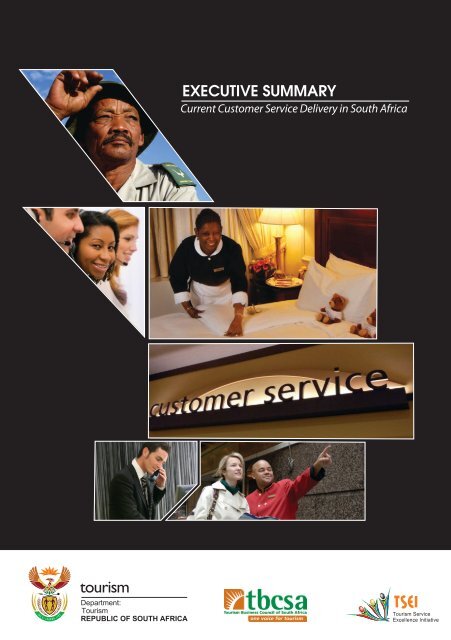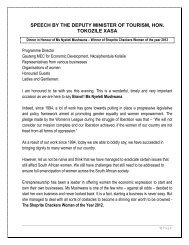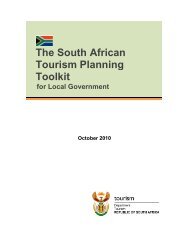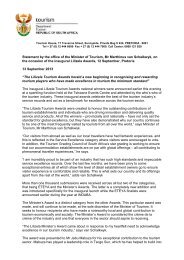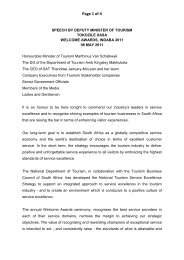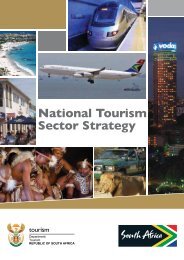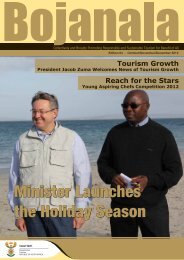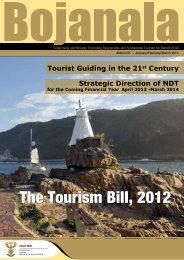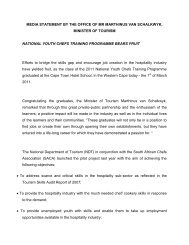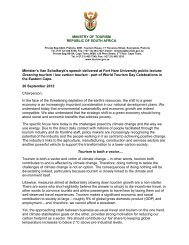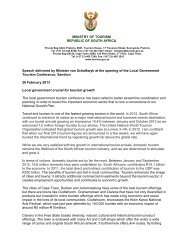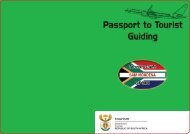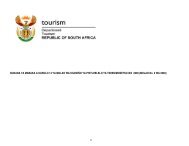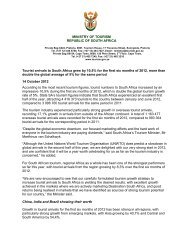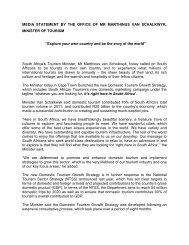Executive Summary - Department of Tourism
Executive Summary - Department of Tourism
Executive Summary - Department of Tourism
Create successful ePaper yourself
Turn your PDF publications into a flip-book with our unique Google optimized e-Paper software.
CONTENTS<br />
EXECUTIVE SUMMARY 1<br />
BACKGROUND 5<br />
METHODOLOGY 7<br />
1. Focus Groups 8<br />
2. Focus Groups Surveys 8<br />
3. Airport Intercepts 8<br />
4. Port <strong>of</strong> Entry - Border Surveys - Swaziland 9<br />
5. Observational Audits 9<br />
DETAILED FINDINGS 10<br />
Customer Service in General 11<br />
CUSTOMER SERVICE IN SOUTH AFRICA 14<br />
CONCLUSION 25
01<br />
EXECUTIVE SUMMARY<br />
1
Purpose & Rationale<br />
In response to dealing with the realities<br />
<strong>of</strong> South Africa’s ranking in terms <strong>of</strong><br />
competitiveness and also to transform the<br />
industry into a globally competitive service<br />
economy and a world destination <strong>of</strong> choice,<br />
the National <strong>Department</strong> <strong>of</strong> <strong>Tourism</strong> (NDT)<br />
in collaboration with the <strong>Tourism</strong> Business<br />
Council <strong>of</strong> South Africa (TBCSA) contracted<br />
the Disney Institute to conduct extensive<br />
customer service research in all nine<br />
provinces, in order to fully understand the<br />
levels and standards <strong>of</strong> service within tourism<br />
value chain.<br />
Methodology & Approach<br />
The research was conducted from September<br />
28, to November 2, 2009 and following data<br />
was gathered and assessed for the fi nal<br />
report:<br />
• 28 Focus Groups with 203 participants<br />
• 203 Focus Group Participant Surveys<br />
• 564 Airport Intercept Surveys<br />
• 75 Port <strong>of</strong> Entry Border Surveys<br />
• 124 Observational Audits<br />
Limitations <strong>of</strong> Research Process<br />
Limitations to the study are related to the<br />
following issues:<br />
1. Tardiness - Delays in starting sessions as<br />
scheduled.<br />
2. RSVP confi rmation - Delays in confi rming<br />
participation in focus group meeting.<br />
3. Hierachical mentality especially from the<br />
public sector.<br />
Findings & Highlights<br />
The research identifi ed several critical<br />
elements currently having a negative impact<br />
on the consistent delivery <strong>of</strong> excellent<br />
customer service in South Africa, including:<br />
the legacy <strong>of</strong> apartheid, poor or indifferent<br />
attitudes <strong>of</strong> some employees, inadequate job<br />
training, defi cient general education, poor<br />
recruitment and selection processes, a lack<br />
<strong>of</strong> urgency, a tendency towards autocratic<br />
management rather than participative<br />
leadership, and an imbalanced focus on<br />
technical job skills opposed to interpersonal<br />
“customer and people” skills development.<br />
Also expressed in the fi ndings was the<br />
inability <strong>of</strong> most South Africans to provide<br />
constructive feedback in the workplace, which<br />
has enabled the continuance <strong>of</strong> poor service<br />
and the acceptance <strong>of</strong> poor service as the<br />
norm. We also discovered that <strong>of</strong>ten front-line<br />
employees have never experienced excellent<br />
customer service or “being served” in the type<br />
<strong>of</strong> establishments in which they are employed.<br />
Thus, there is a disconnect that prevents<br />
employees from consistently providing a<br />
level <strong>of</strong> excellent service to customers that<br />
addresses the wants and needs <strong>of</strong> individuals<br />
and groups, without having had their own<br />
personal experiences.<br />
The research also identifi ed a signifi cant<br />
conviction that, while private sector<br />
organizations try to deliver acceptable<br />
2
levels <strong>of</strong> customer service, the public sector<br />
was seen with contempt, due to ineffective<br />
deployment practices, attitudes <strong>of</strong> entitlement,<br />
non-existent customer service and customers<br />
being viewed as nuisances. In fact, most<br />
expressed a degree <strong>of</strong> hopelessness that<br />
the public sector cannot change its current<br />
paradigm. Finally, it was expressed that a<br />
strong national customer service “rallying cry”<br />
was critical to excite, mobilize and unify the<br />
country towards service excellence in 2010<br />
and beyond!<br />
Recommendations:<br />
Short-term Interventions<br />
Phase Two - Immediate Recommendations.<br />
In preparation for South Africa to host<br />
a successful 2010 Soccer World Cup,<br />
an undertaking <strong>of</strong> a rapid deployment <strong>of</strong><br />
leadership and customer service programs,<br />
in a collaborative public and private sector<br />
effort, to a targeted segment <strong>of</strong> people in<br />
tourism and the public sector, with the goal to<br />
positively impact on the tourism experience<br />
was recommended.<br />
The undertaking is daunting, but achievable, as<br />
this “quick boost” could jump-start the country<br />
to a more focused service excellence mindset<br />
beyond 2010, and have a positive infl uence<br />
on the country’s current competitiveness<br />
ranking <strong>of</strong> 111 out <strong>of</strong> 124 countries.<br />
A six-phased approach to the pre-World Cup<br />
deployment <strong>of</strong> programs was recommended.<br />
These phases were proposed to commence<br />
early January 2010 and conclude at end <strong>of</strong><br />
March 2010. In this aggressive implementation<br />
National <strong>Department</strong> <strong>of</strong> <strong>Tourism</strong> (NDT) would<br />
work with representatives from the industry<br />
to train public and private sector; senior<br />
executives, leaders, middle managers,<br />
front-line supervisors and front-line staff.<br />
During the initial phases, it is suggested<br />
that training <strong>of</strong> 80 senior leaders, 7,500<br />
mid-level and front-line leaders, as well as<br />
12,000 front-line employees who will be<br />
directly providing customer service during<br />
FIFA 2010 be conducted. In this collaborative<br />
effort, key partners would participate in the<br />
selection <strong>of</strong> 50 Service Excellence Training<br />
Ambassadors, who would be empowered,<br />
equipped and provided the tools to assist in<br />
the implementation <strong>of</strong> this service excellence<br />
initiative. These training ambassadors would<br />
provide an ongoing connection to the “Service<br />
Excellence Approach”.<br />
They would also be trained to conduct<br />
customer service audits, and to observe<br />
ongoing service delivery levels for purposes<br />
<strong>of</strong> developing a continuous improvement<br />
mindset and encouraging the practice <strong>of</strong><br />
constructive feedback. These new abilities<br />
will help to ensure service excellence in 2010<br />
and beyond. In the proposed leadership<br />
excellence programs, leaders would learn<br />
proven, critical strategies and tactics used<br />
to consistently deliver world-class guest<br />
experiences, while respecting differences in<br />
local cultures. The tailored customer service<br />
program for front-line employees would focus<br />
on critical behavioral skills designed to deliver<br />
excellent customer service, in conjunction<br />
with a supportive toolkit for immediate and<br />
future reference.<br />
3
Long-term Interventions<br />
Phase Three – Recommendations for<br />
South Africa Beyond 2010<br />
In order for South Africa to fully benefi t<br />
from the short-term recommendations a<br />
holistic approach should be considered that<br />
optimizes synergy in South Africa beyond<br />
World Cup. After these short-term solutions<br />
are implemented, South Africa has the<br />
extraordinary opportunity to undertake a<br />
cultural/organizational alignment that will<br />
focus and mobilize the entire country for<br />
the future. The keys to alignment are a<br />
shared common purpose, commitment and<br />
distributive leadership. Components <strong>of</strong> the<br />
alignment process could entail, but are not<br />
limited to:<br />
The optimal state <strong>of</strong> alignment is when<br />
“strategy, people, customers and key<br />
processes work in concert to drive growth<br />
and bottom-line results.”When organizations<br />
are aligned and providing excellence, they<br />
have high-level capabilities throughout the<br />
organization to rapidly adjust to ever-changing<br />
demands and the ability to build and maintain<br />
excellent superior infrastructures that<br />
repeatedly deliver intended results. However,<br />
it must be understood that attaining alignment<br />
is a never-ending process <strong>of</strong> identifying and<br />
doggedly correcting misalignments that push<br />
an organization away from its core ideology or<br />
impede progress’’.<br />
Conclusion<br />
• Aligning Leaders: Senior Leadership<br />
Workshops.<br />
• The Creation <strong>of</strong> an In-house Alignment<br />
Website.<br />
• Initial Alignment Measurement.<br />
• Debrief and Feedback to Senior<br />
Management.<br />
• Creation <strong>of</strong> Action Teams.<br />
• Second Assessment and Debrief.<br />
Having outlined the research recommendations,<br />
there is a tremendous amount <strong>of</strong> work<br />
to be done to accomplish and meet stated<br />
goals and satisfy potentially millions <strong>of</strong> visitors<br />
to the country. Thus, the urgency to begin the<br />
transformation <strong>of</strong> South Africa’s customer service<br />
culture is critical, as it begins the exciting<br />
journey towards service excellence.<br />
4
02<br />
BACKGROUND<br />
5
BACKGROUND<br />
Currently, <strong>Tourism</strong> is one signifi cant contributor<br />
to the South African economy. Below is the<br />
breakdown <strong>of</strong> the contribution in 2009:<br />
• <strong>Tourism</strong> contributes about 189.4 billion to<br />
the GDP.<br />
• 919 800 jobs are created directly and<br />
indirectly from tourism.<br />
• We receive about 9,9 million visitors.<br />
• South Africa is a value for money destination.<br />
• We have a great all year round weather.<br />
• Infrastructure in par with the best in the<br />
world.<br />
• The country is well marketed internationally.<br />
• The country has diverse product <strong>of</strong>fering.<br />
• Our currency is doing well under current<br />
global fi nancial constraints.<br />
Currently South Africa does not have an<br />
integrated approach to service excellence.<br />
There is a myriad <strong>of</strong> initiatives that are not<br />
integrated into one strategy for the country.<br />
Therefore, there is a need to consolidate all<br />
efforts and come out with a unifi ed strategy<br />
that will guide service excellence in the sector<br />
for 2010 and beyond.<br />
In seeking to improve overall customer service<br />
delivery, the National <strong>Department</strong> <strong>of</strong> <strong>Tourism</strong><br />
(NDT) crafted the Strategic Plan <strong>of</strong> 2008,<br />
“Taking Service Excellence in the <strong>Tourism</strong><br />
Service Value Chain to Greater Heights.” The<br />
short-term focus <strong>of</strong> the plan is to “deliver a<br />
memorable, unforgettable service experience<br />
to visitors during 2010 and beyond.” And its<br />
ambitious long-term goal is to “transform<br />
South Africa into a globally competitive<br />
service economy and the world’s destination<br />
<strong>of</strong> choice!”<br />
In order to fully understand the current state<br />
<strong>of</strong> customer service delivery in South Africa,<br />
in both the private and public sectors, Disney<br />
Institute (DI) was contracted to conduct<br />
extensive customer service research in all<br />
nine provinces.<br />
The research was conducted from September<br />
28, to November 02, 2009 with two DI cast<br />
members in the fi eld working in concert with<br />
the <strong>Tourism</strong> Business Council <strong>of</strong> South Africa<br />
(TBCSA). The research took a multi-level<br />
methodological approach; to ensure all unique<br />
touch points in the tourism experience were<br />
audited, as well as leaders from the public<br />
and private sectors and recent guests to<br />
South Africa were solicited to provide critical<br />
and candid input. To kick start the research<br />
phase <strong>of</strong> the project, a project familiarization<br />
workshop was held in Centurion, South Africa<br />
September 25, 2009 with key stakeholders <strong>of</strong><br />
the project and the DI team.<br />
6
03<br />
METHODOLOGY<br />
7
In order to assess the current levels <strong>of</strong><br />
customer service in South Africa, data from<br />
the following was used:<br />
• Focus Groups<br />
• Focus Group Surveys<br />
• Airport Intercept Surveys<br />
• Port <strong>of</strong> Entry Border Surveys<br />
• Observational Audits<br />
Below is an explanation <strong>of</strong> each methodology:<br />
FOCUS GROUPS<br />
A total <strong>of</strong> 28 focus groups were conducted<br />
with 203 participants from the public and<br />
private sectors in order to:<br />
• Understand the current state <strong>of</strong> customer<br />
service delivery (public and private) in<br />
specifi ed service sectors throughout South<br />
Africa.<br />
• Collect diversifi ed insights and local<br />
perspectives.<br />
• Gather actual statements.<br />
• Gain non-verbal feedback to add insights to<br />
the meanings <strong>of</strong> their words.<br />
Each focus group session was attended ± 10<br />
participants. In most cases, separate sessions<br />
were held for the public and private sector.<br />
Selection criteria<br />
• Attendees nominated by their respective<br />
associations.<br />
• Age limit and gender were prescribed.<br />
• Contact with customer service providers<br />
(e.g. dined out, taken a taxi, airplane trip,<br />
and/ or visited a tourist attraction).<br />
FOCUS GROUPS SURVEYS<br />
All <strong>of</strong> the focus group participants (203)<br />
completed a one-page South Africa Customer<br />
Service survey prior to the focus group<br />
discussions in order to quantify and assess:<br />
• Participants’ overall satisfaction with<br />
customer service in South Africa.<br />
• Key touch points (for example, restaurants,<br />
hotels, taxis, car rentals, etc.).<br />
• Other comments and insights.<br />
AIRPORT INTERCEPTS<br />
A total <strong>of</strong> 767 surveys were collected among<br />
travelers in the departure and shopping areas<br />
at airports in CapeTown and OR Tambo in<br />
order to:<br />
• Gain assessments <strong>of</strong> South Africa’s<br />
customer service delivery from a broader<br />
audience (i.e. residents <strong>of</strong> South Africa,<br />
Africa, and international travelers).<br />
• Collect real time and fresh information <strong>of</strong><br />
travelers’ perceptions as they depart the<br />
country.<br />
• Quantify results for greater statistical<br />
precision.<br />
• Supplement qualitative efforts.<br />
• Gather additional feedback in a timely and<br />
cost-effective manner (i.e. all adult travelers<br />
qualifi ed, and it was a captive environment).<br />
With airport approval and knowledge, surveys<br />
were collected during peak travel times to be<br />
most effi cient. To reduce bias, the travelers<br />
were asked to complete the surveys themselves.<br />
8
PORT OF ENTRY - BORDER SURVEYS –<br />
SWAZILAND<br />
A total <strong>of</strong> 75 surveys were completed with<br />
visitors entering South African either on foot<br />
or via vehicles at the Swaziland border in<br />
Oshoek in order to:<br />
• Assess customer service delivery <strong>of</strong><br />
passport and customs control at the border.<br />
• Understand the purpose <strong>of</strong> their visit to<br />
South Africa.<br />
• Quantify results for greater statistical<br />
precision.<br />
• Supplement qualitative and other<br />
quantitative research efforts.<br />
OBSERVATIONAL AUDITS<br />
A total <strong>of</strong> 126 observational audits were<br />
completed by the DI team when they were<br />
engaged in planned tourism experiences,<br />
day-to-day activities and as they experienced<br />
or observed interactions in South Africa.<br />
Twenty-two establishments and attractions<br />
were visited across the country.<br />
LIMITATIONS OF THE RESEARCH<br />
PROCESS<br />
The following were challenges that might have<br />
negatively impacted some <strong>of</strong> the scheduled<br />
focus groups:<br />
• Tardiness – on most average the focus<br />
groups stated later than scheduled.<br />
• RSVP Confi rmation – non-response from<br />
participants invited to the focus groups.<br />
• Lack <strong>of</strong> municipality support and urgency –<br />
contributed to last minute invitations being<br />
sent which impacted on attendance.<br />
• Impact <strong>of</strong> telemarketing – perception <strong>of</strong><br />
participants <strong>of</strong> telemarketing, researchers<br />
experienced challenges when using the<br />
recruiting screeners to qualify nominated<br />
participants.<br />
• Hierarchical mentality – some participants<br />
would only speak to a certain level <strong>of</strong> a<br />
person and not the researchers base on<br />
their occupational level.<br />
• Public sector – there were barriers to most<br />
focus groups with the public sector.<br />
• Creating a Magic Book – delivery <strong>of</strong> the<br />
incentive gift was late.<br />
9
04<br />
DETAILED FINDINGS<br />
10
The following is the detailed fi ndings obtained<br />
from the interviews conducted:<br />
Customer Service in General<br />
Definition – What is customer service<br />
Customer service was defi ned, when<br />
participants were asked to defi ne customer<br />
service, without using the words “customer” or<br />
“service” in their defi nition.<br />
Different interpretations were provided by<br />
participants. The following examples <strong>of</strong><br />
defi nitions provided were:<br />
• Attending to the needs <strong>of</strong> the consumer<br />
<strong>of</strong> your products and seeking feedback in<br />
order to maintain service <strong>of</strong> high quality.<br />
(Eastern Cape).<br />
• Putting an effort to make sure the person<br />
on the receiving end is happy. Working with<br />
a smile delivering quality work with a good<br />
attitude and respect (KwaZulu Natal).<br />
• Being warm, talking with the guest with<br />
interest, smile and valuing their presence.<br />
(Mpumalanga).<br />
Customer – focused<br />
The following are some <strong>of</strong> the interpretations<br />
provided by participants:<br />
• Attending to the needs <strong>of</strong> the consumer<br />
<strong>of</strong> your products and seeking feedback in<br />
order to keep the standards <strong>of</strong> high quality<br />
service.<br />
• The efficient and pr<strong>of</strong>essional delivery <strong>of</strong><br />
services to clients.<br />
• The manner in which you treat people and<br />
conduct your business - making it easier<br />
for customers to recommend it to others,<br />
knowing the quality <strong>of</strong> your establishment’s<br />
<strong>of</strong>ferings.<br />
Product Focused<br />
The description provided by the participants<br />
with regards to product focused were the<br />
following:<br />
• A system <strong>of</strong> ongoing quality management<br />
that enhances the consistent delivery <strong>of</strong><br />
guest care.<br />
• The enjoyable delivery <strong>of</strong> a product.<br />
• Passionate and knowledgeable interactions<br />
in the delivery <strong>of</strong> a product or service<br />
- is what you provide and the way<br />
you provide it to the client.<br />
Service Focused<br />
The views shared by participants with regards<br />
to service focused were the following:<br />
• Putting an effort to make sure that the<br />
person on the receiving end is happy.<br />
• Working with a smile and delivering quality<br />
work with a good attitude and respect.<br />
• Being warm, talking with the guest with<br />
interest, smile and valuing their presence.<br />
• Excellent reaction, experience, courtesy,<br />
warmth, value for money spent, quality<br />
investment in satisfaction and the ability<br />
to capture the tourists’ soul from the<br />
experience.<br />
Where is Customer Service Important<br />
The following information was shared:<br />
• The general consensus is that customer<br />
service is important in all sectors and not<br />
just to one particular industry.<br />
11
• Every existing organization needs to be<br />
attentive to customer service.<br />
• Happy customers are repeat customers<br />
and unhappy customers spread the news.<br />
• Every enterprise has customers, therefore<br />
customer care is everybody’s business.<br />
• Customer service is important in both<br />
public and private sectors.<br />
What is World Class Customer Service<br />
These were some <strong>of</strong> the areas outlined as<br />
refl ecting World-Class Customer Service:<br />
• World-Class Customer Service was<br />
defined as the total seamless experience<br />
<strong>of</strong> great quality.<br />
• Personalized attention were the key<br />
themes <strong>of</strong> excellent customer service<br />
participants experienced and remembered<br />
(A hotel wishes me happy birthday when<br />
it’s my birthday, you go to a facility with<br />
a welcome note with your name, reception<br />
greets you by name, you feel you belong,<br />
everyone was enthusiastic from the<br />
cleaner and up, on a visit to a hotel my<br />
name was on all <strong>of</strong> the amenities in the<br />
room).<br />
What is Good Customer Service<br />
These were some <strong>of</strong> the areas outlined as<br />
refl ecting Good Customer Service:<br />
• Delivering on the implied promise or<br />
meeting expectations; however it was<br />
universally agreed, that good customer<br />
service is not good enough!<br />
• When you have been attended to, nothing<br />
to complain about .<br />
• Service is good, not <strong>of</strong>fended, everything<br />
is technically correct, but not beyond.<br />
What is Mediocre Customer<br />
Service<br />
The following are elements that describe<br />
Mediocre Customer Service:<br />
• Mediocre service was seen as service with<br />
minimally acceptable levels <strong>of</strong> service and<br />
emotions.<br />
• Service that usually little evokes response<br />
from customers.<br />
What is Poor Customer Service<br />
The following are elements that describe Poor<br />
Customer Service:<br />
• Poor service was viewed as unacceptable<br />
and emotionally detached, customers<br />
would not return to an establishment, and<br />
they will tell others <strong>of</strong> their bad experience.<br />
• Ignoring the customer, with I don’t care<br />
attitude.<br />
• Something going wrong is not poor<br />
service… the response to the poor service<br />
makes the difference between great and<br />
poor service (not responding to complaints,<br />
not replacing the <strong>of</strong>fered service as per<br />
customer’s request – customer will never<br />
visit the place again).<br />
• No product knowledge, no desire to help<br />
and it goes beyond poor attitude.<br />
• Poor service makes you feel angry, cross<br />
and feeling cheated.<br />
• Employees that argue with customers.<br />
• Demeaning the customer… telling them<br />
they do not understand.<br />
• Employees that ignore and talk badly to and<br />
about customers.<br />
• Customers not being greeted.<br />
• Long queues at banks during lunch and<br />
tellers leaving for breaks.<br />
12
• In the public hospitals people dying due to<br />
poor service and neglectful service.<br />
• Taxis loud, rude and dirty.<br />
• Spending two hours at Home Affairs to<br />
make a payment while the staff members<br />
are on their phones chatting to their<br />
colleagues/friends and others are eating<br />
(unpr<strong>of</strong>essional behavior and unacceptable<br />
image).<br />
• South Africans as a society in general<br />
accept mediocre to bad service without<br />
complaining. This is laughed <strong>of</strong>f as - it’s just<br />
South Africa.<br />
Actions Taken as a Result <strong>of</strong> Poor<br />
Service and Outcomes:<br />
• Participants vary in their reactions in<br />
providing feedback for poor service they<br />
receive.<br />
• Some participants think that complaining<br />
will not help, it might cause someone to lose<br />
their job, or the person will get even worse<br />
service.<br />
• Others realize the value <strong>of</strong> providing<br />
feedback to the manager or via an online<br />
customer complaint site.<br />
• Most <strong>of</strong> the participants do not give<br />
feedback because <strong>of</strong> the “humanness” <strong>of</strong><br />
the South African culture, not to complain.<br />
13
05<br />
CUSTOMER SERVICE<br />
IN SOUTH AFRICA<br />
14
Overall Impressions<br />
The following participants’ descriptors<br />
provides a window into their perceptions <strong>of</strong><br />
customer service, when asked to use only one<br />
or two adjectives to describe overall customer<br />
service in South Africa. More negative<br />
descriptors were attributed to customer<br />
service than positive ones, and with more<br />
intensity, which refl ected the participants’<br />
frustrations and experiences with customer<br />
service throughout South Africa. Some<br />
<strong>of</strong> the postitive descriptors are adequate,<br />
friendly, hospitable and satisfactory and some<br />
negative descriptors are appalling, arrogant,<br />
hostile and non-existent.<br />
General Impression <strong>of</strong> South African<br />
Culture<br />
The following general information was shared:<br />
• The inconsistent service provided.<br />
• Participants question the motives <strong>of</strong><br />
employees when they received good<br />
service because they are accustomed to<br />
low levels <strong>of</strong> service.<br />
• Participants were appalled with poor service<br />
that was attributed to race or class bias.<br />
• Poor training and the impact <strong>of</strong> apartheid<br />
system.<br />
• South Africans are not capable <strong>of</strong> delivering<br />
excellent service; because they do not<br />
believe in themselves and that “our history<br />
encourages apathy”.<br />
• Different cultures in South Africa have<br />
different standards <strong>of</strong> customer care<br />
service.<br />
• The level <strong>of</strong> service is in direct proportion to<br />
your group size, the smaller the group the<br />
poorer the service because this has a direct<br />
impact on the size <strong>of</strong> the tip.<br />
• Lack <strong>of</strong> confi dence that the front line staff<br />
have the capacity to deliver excellent<br />
customer service.<br />
• If you engage South African people, you will<br />
get a much more warm, friendly and helpful<br />
interaction than in Germany, France, UK or<br />
Japan.<br />
• The level <strong>of</strong> service also depends on social<br />
and racial standings, as well as, stereotypes.<br />
Public Sector<br />
The following general information was shared:<br />
• There is very little respect <strong>of</strong> the public<br />
sector, employees are viewed as arrogant<br />
and disrespectful.<br />
• Misguided sense <strong>of</strong> entitlement, and work to<br />
collect a paycheck.<br />
• Annoyed by employees’ tea breaks,<br />
conversations with co-workers or talking on<br />
the phone.<br />
• Public servants act like they are doing<br />
consumers a favor and consumers are<br />
viewed as nuisance.<br />
• They ignore the fact that they are serving<br />
their community and country.<br />
• Poor service is caused by the fact that<br />
unqualifi ed people are employed in the<br />
public sector.<br />
• Government has created the impression<br />
that tourism is booming and anyone can<br />
work in tourism. This situation caused<br />
an infl ux <strong>of</strong> unqualifi ed employees in the<br />
industry.<br />
15
Overall South Africa Customer Service<br />
Rating<br />
Participants were asked to rate their overall<br />
impression <strong>of</strong> customer service in South Africa<br />
and then share with each other their reasons<br />
for their rating <strong>of</strong> excellent, good or mediocre.<br />
The following general information was shared:<br />
Excellent Impressions<br />
• Those who had excellent impressions<br />
were based on emotions and personal<br />
connections felt during interactions and<br />
transactions.<br />
• Customers experience South African<br />
people/service providers to be much more<br />
friendly and helpful compared to other<br />
countries like Germany, France and Japan.<br />
Mediocre Impressions<br />
• The basis <strong>of</strong> the mediocre impressions<br />
centered on service inconsistency, lack<br />
<strong>of</strong> empowerment, exposure, the effects <strong>of</strong><br />
apartheid with its non-inclusive environment<br />
and policies to all people.<br />
• South Africans are warm people, but<br />
they lack the push to pr<strong>of</strong>essionalize that<br />
warmth.<br />
• Lack <strong>of</strong> provision <strong>of</strong> space for staff to use<br />
their own creativity and discretions where<br />
necessary.<br />
• Staff never experienced customer service<br />
and therefore they do not have an<br />
understanding <strong>of</strong> what they should aspire to<br />
(exposure and experience).<br />
• Service based on race; better service for<br />
whites due to the belief that they can afford<br />
to provide better tips.<br />
• No motivation beyond putting food on the<br />
table.<br />
• Lack <strong>of</strong> effective training.<br />
Poor/Less Favorable Impressions<br />
• Poor/less favorable service was attributed<br />
predominantly to the non-existent positive<br />
service culture in the public sector.<br />
• Batho-pele principles not being adhered to.<br />
• Poor service attributed to overall bad<br />
attitudes, indifference and a general lack <strong>of</strong><br />
understanding the negative impact <strong>of</strong> their<br />
behaviors on the business.<br />
Public Sector<br />
• Immigration is viewed as pathetic,<br />
customers sent from pillar to post get<br />
immigration documents.<br />
• No service consistency and passion.<br />
• Employees do not understand the big<br />
picture and the impact <strong>of</strong> their actions on<br />
the economy.<br />
• Service structures and institutions like post<br />
<strong>of</strong>fi ces, hospitals, taxis and police lack<br />
skilled resources.<br />
• Subcultures in our culture are very<br />
hierarchical; therefore South African society<br />
is very autocratic.<br />
• A customer is not seen as a guest and<br />
therefore not effi ciently and effectively<br />
served.<br />
Challenges and Barriers<br />
Participants were asked to explain what<br />
they felt were the challenges and barriers<br />
confronting South Africa in its ability to provide<br />
consistent customer service. Challenges were<br />
identifi ed as being emotional, psychological<br />
and cultural in nature.<br />
Emotional & Psychological Barriers<br />
• Since democracy the service industry is<br />
seen as an industry <strong>of</strong> subservience and<br />
not <strong>of</strong> service.<br />
16
• It is also seen as a stepping-stone to<br />
something better, so the wrong people are<br />
in the right positions for the wrong reason<br />
with their poor and indifferent attitudes.<br />
• An attitude <strong>of</strong> indifference is our biggest<br />
barrier, people are not committed.<br />
• There is <strong>of</strong>ten an attitude <strong>of</strong> confrontation in<br />
service delivery and recovery.<br />
• A mentality that service jobs are low class,<br />
respected pr<strong>of</strong>ession included medicine,<br />
architect commerce etc.<br />
• Lack <strong>of</strong> urgency and time consciousness<br />
created challenges.<br />
Cultural Barriers<br />
• The many languages in South Africa.<br />
Guilt over our past. We have been a very<br />
autocratic society, whites, and blacks and<br />
colored alike. We are a very passive society.<br />
• We are conflicted society and we interpret<br />
situations differently and the country is not<br />
quite ready to accept. The black culture<br />
has a strong authoritarian structure, black<br />
children were taught not to question<br />
authority.<br />
Other Barriers and Challenges:<br />
ownership or connection to their employers<br />
or organizations.<br />
Tourists are customers<br />
• Lack <strong>of</strong> understanding that tourists are<br />
customers and that business and the country<br />
benefi t from their contribution.<br />
Labour Brokers<br />
• The infl uence <strong>of</strong> labor brokers in the<br />
industry creates disloyalty in employees<br />
with its transitory processes along with<br />
employees already being disconnected and<br />
disenchanted in the world <strong>of</strong> work.<br />
Discrimination<br />
• Discrimination either overtly or covertly<br />
colors customer service interactions.<br />
• Black on black discrimination is a real<br />
problem.<br />
• The infl uence <strong>of</strong> our trade unions has a<br />
negative impact on our employees. People<br />
want the maximum pay for the minimum<br />
work.<br />
• Discrimination based on politics, class,<br />
color and gender is a big problem in South<br />
Africa.<br />
Big Picture<br />
• Other barriers and challenges identifi ed<br />
were a general lack <strong>of</strong> employees<br />
understanding <strong>of</strong> the big picture.<br />
• Understanding who is a customer,<br />
discrimination, hiring practices and training<br />
issues.<br />
• Employees are only told a fraction <strong>of</strong> what<br />
they need to know, thus do not feel an<br />
Hiring & Training Issue<br />
• Another challenge articulated was hiring<br />
the right people and providing them with<br />
consistent customer service training for<br />
their service jobs.<br />
• Participants felt screening processes are<br />
poor and the wrong types <strong>of</strong> people are<br />
being hired and poorly trained and they<br />
lacked adequate knowledge to do their job<br />
effi ciently.<br />
17
Roles <strong>of</strong> different players were<br />
outlined as follows:<br />
Reasons for their unacceptable behavior<br />
are attributed to the following:<br />
Employee Focused<br />
• Staff training.<br />
• Employees be part <strong>of</strong> the business and be<br />
informed on the products and processes.<br />
• Employees need to know and feel that they<br />
are being appreciated.<br />
• Do not fi re people who make mistakes,<br />
teach them how to perform correctly.<br />
• Inspire staff to do well and provide incentives<br />
for excellence.<br />
The challenging living conditions <strong>of</strong><br />
employees, low pay, lack <strong>of</strong> training,<br />
survival mode, victimized by their peers for<br />
exceeding expectations, lack <strong>of</strong> confi dence<br />
to approach guests, lack <strong>of</strong> knowledge on<br />
cultural difference resulting in interpersonal<br />
problems with customers, low salaries, like<br />
other individuals at the lower levels they see<br />
themselves as just numbers.<br />
Leader Focused<br />
• Lead by example.<br />
• Be inspirational.<br />
Processes<br />
• Being on top <strong>of</strong> service recovery.<br />
• Continuous training and updating on<br />
processes.<br />
Employees’ Role<br />
• Feedback systems in place to reward or<br />
discipline employees.<br />
• Train and provide tools and positive<br />
environment.<br />
Front-line Staff<br />
Most <strong>of</strong> the current front line staff have bad<br />
attitudes, lack <strong>of</strong> awareness <strong>of</strong> customer<br />
service ethics and racial undertones <strong>of</strong><br />
discrimination which encouraged<br />
discriminatory treatment.<br />
Public Sector<br />
• Participants explained that the demoralizing<br />
culture within the public sector has a<br />
negative effect on the service.<br />
• Passionate employees leave and those<br />
remaining are more concerned about their<br />
rights, rather than the customers.<br />
• The overall environment within most <strong>of</strong> the<br />
public sector is not customer service<br />
focused.<br />
• Public employees see customers as<br />
annoyance.<br />
• Great service is not delivered because there<br />
is no culture or standards <strong>of</strong> excellence in<br />
organizations. If you have passion when<br />
you get a job in the public sector you will<br />
loose it quickly.<br />
• There is no consequence for excellent and<br />
poor service.<br />
• Government does not see people/public as<br />
customers.<br />
18
Service Industry<br />
• Participants expressed concern <strong>of</strong> the<br />
stigma in the service industry, it is seen as a<br />
subservient industry. Thus, getting a limited<br />
pool <strong>of</strong> quality employees passionate about<br />
the industry.<br />
• Too many people see the service industry<br />
as demeaning or beneath them or their<br />
children. There may be some resentment,<br />
because workers see people spending<br />
more on a meal than they earn in a day or<br />
more; especially a black person to another<br />
black person. How did you get to the front <strong>of</strong><br />
the pay line, while I’m at the back <strong>of</strong> it<br />
• Apartheid would not allow you to challenge<br />
the ideas <strong>of</strong> superiors, people were<br />
expected to comply.<br />
Cultural<br />
• The strength <strong>of</strong> the infl uence <strong>of</strong> the country’s<br />
past on people’s current behavior is deeply<br />
rooted.<br />
• Black children were taught not to question<br />
authority; so black employees have a<br />
diffi culty in taking initiative.<br />
• If I am black, people don’t expect me to be<br />
their boss.<br />
• It seems that foreign workers have a<br />
stronger work ethic than our own local<br />
workers and that is creating challenges.<br />
Employee’s Role:<br />
Deal with PreferentialTreatment<br />
• Preferential treatment is provided to white<br />
customers and to customers that the frontline<br />
assumes will tip big.<br />
• Black on black discrimination is rampant<br />
and stereotypes <strong>of</strong> other cultures existed<br />
too when employees decide to provide<br />
service or not.<br />
• Race plays a role in the level <strong>of</strong> service you<br />
get. If you are clean and dressed well, you<br />
get better and quicker service.<br />
• Regular customers get better service.<br />
• Indian, Israeli and Russian tourists are<br />
unpopular with employees.<br />
• They treat others as they are treated.<br />
Provide Feedback Systems<br />
• Effective Performance appraisals to be<br />
introduced and applied.<br />
• Element <strong>of</strong> fear to be removed from<br />
feedback.<br />
Manager’s Treatment <strong>of</strong> Employees<br />
• Managers should be warm with employees<br />
and customers alike.<br />
• Managers to lead, inspire people,<br />
approachable and earn their respect.<br />
• Mistakes to be taken as learning<br />
opportunities.<br />
• Management is transactional and<br />
leadership is transformational, we have<br />
many more managers than leaders in South<br />
Africa. Leaders must be accessible to their<br />
employees. The CEO needs training just as<br />
much as the manager and the subordinate<br />
do.<br />
• Managers are badly trained and they do not<br />
know how to lead people.<br />
• The management is drawn largely from the<br />
white population and the pattern must be<br />
appropriately addressed.<br />
• The way you manage the staff is vital, if they<br />
do not feel respected, there is no way they<br />
can treat the customer with respect.<br />
19
Organization’s Role:<br />
Processes<br />
• Some organizations have internal and /or<br />
external processes in place for customer<br />
feedback and to clarify employee service<br />
delivery expectations.<br />
• In the banks, the consequences <strong>of</strong> poor<br />
service are severe. Ombudsman services<br />
are used for complaints.<br />
No Processes<br />
• No effective systems for screening <strong>of</strong> staff.<br />
• No career path, more <strong>of</strong>ten people get<br />
appointed to positions that internal<br />
candidates are much more qualifi ed for<br />
without them being considered.<br />
Recruitment, Selection & Retention<br />
• Private sector is serious about customer<br />
service and it is fully aware that the sector is<br />
pr<strong>of</strong>i ting from it.<br />
• Public sector is not paying attention to it, it<br />
focuses on politics.<br />
• The private sector does not take<br />
substandard staff.<br />
• Hospitality is a very low paying industry...<br />
If you are sharp, even if you like the work,<br />
you will leave and go into a career that gives<br />
you an opportunity to grow . . . and be paid<br />
more.<br />
Training and Development<br />
• SA Host has been around since 1998. An<br />
improvement on the “Welcome Campaign”<br />
and building block for “Ubuntu”.<br />
• 90% <strong>of</strong> the tourism industry is run by SMMEs<br />
and only 1% <strong>of</strong> them have leadership skills.<br />
Therefore the most important industry is run<br />
by unqualifi ed people, there is little critical<br />
thinking and innovation, the focus is on<br />
following the rules.<br />
• Managers lack self-confi dence due to<br />
limited training hence they are from time to<br />
time deployed.<br />
Conflict/Complaint Resolutions Process<br />
• Service recovery processes take too long,<br />
and so you rarely see a change in the<br />
company.<br />
• There is a need to have processes and<br />
mechanism in place to provide service<br />
recovery in government.<br />
• External complaint service is available,<br />
customers call the main operator directly<br />
and internally there are suggestion boxes.<br />
Understanding Customer Needs and<br />
Wants<br />
• It is important for staff to know their job and<br />
to understand the role they play in the big<br />
picture.<br />
• Being taught about cultural differences will<br />
result in improving interpersonal relations.<br />
• Public sector customer service is an<br />
exception; they do not have to compete in<br />
the market.<br />
• Satisfaction surveys to be done annually.<br />
Touch Points<br />
The following areas were identifi ed as key<br />
touch points:<br />
Restaurants (table service and fast food),<br />
hotels, taxis, shuttles, car rentals, tourism<br />
attractions, events and information, retail,<br />
banks, government and airports.<br />
*A detailed customers’ expectations and realities<br />
are refl ected in the comprehensive report.<br />
20
*Table Service Restaurants<br />
• Most <strong>of</strong> the participants have fi rst-hand<br />
experience using table service restaurants,<br />
tend to have good to-excellent impressions<br />
<strong>of</strong> these restaurants.<br />
• They get most frustrated with incorrect<br />
orders.<br />
• Long waiting periods to be served and<br />
turnover <strong>of</strong> service staff.<br />
Customers’ Expectations<br />
• Greeted and escorted to seat quickly.<br />
• Individual attention.<br />
• Clean table with cutlery on table.<br />
• Receive menu.<br />
• Receive food timely (
Reality (Impressions)<br />
• Customers spend too much time in <strong>of</strong>fi ce /<br />
at counter.<br />
• Distracted employees.<br />
• Unfriendly.<br />
*Taxis<br />
The taxis fight over customers and customers<br />
may be negatively affected in the process<br />
Drivers are very unpr<strong>of</strong>essional, play music<br />
way too loud and will take you <strong>of</strong>f the taxi if<br />
you complain.<br />
In most cases their appearance is not pleasing<br />
and cars are dilapidated and dirty. They have<br />
excellent driving skills which are more relevant<br />
for racecar drivers.<br />
Customers’ Expectations<br />
• Respectful and pr<strong>of</strong>essional.<br />
• Good communication skills.<br />
• Ability to read the customer.<br />
• Cleanliness, road worthy and licensed car<br />
Reality (Impressions)<br />
• Unreliable; inconsistent; unethical.<br />
• Not friendly; abusive or inappropriate<br />
language / discussions (i.e., “talks about<br />
communal issues).<br />
• Unhygienic; dirty; dilapidated.<br />
• Loud music.<br />
*Shuttle Services<br />
Those familiar with shuttle services tend to<br />
have favorable impressions <strong>of</strong> shuttle services<br />
and feel the organization is good. They prefer<br />
to take a shuttle over taxis when it is possible.<br />
They feel the most important aspect is riding<br />
on a clean, reliable shuttle with a focused<br />
knowledgeable driver.<br />
Customers’ Expectations<br />
• Well maintained, clean and reliable car.<br />
• Punctual, knowledgeable and friendly driver.<br />
Reality (Impressions)<br />
• On time.<br />
• Shuttle organization is a good organization.<br />
• Multi-tasking (eating and speeding).<br />
*<strong>Tourism</strong> Attractions/Events/Information<br />
Participants who have visited tourist<br />
attractions and/or events have mixed reviews.<br />
As a tourist, they feel that some attractions are<br />
well run, while others are inferior, unclean, and<br />
“illegal”. There was a general perception that<br />
private attractions are better operated than<br />
government. Individuals working in non-tourist<br />
businesses (e.g.petrol stations) need to be<br />
more tourist-focused and better trained to be<br />
helpful when asked for information. Overall,<br />
respondents value tour guides and staff that<br />
are innovative, proactive, knowledgeable,<br />
accurate, and courteous.<br />
Customers’ Expectations<br />
• User-friendly information.<br />
• All staff knowledgeable and prepared<br />
to answer customer questions about<br />
attractions, culture, natural environment and<br />
area.<br />
• Correct information.<br />
• Safe and comfortable transportation.<br />
• Consistency in cleanliness and excellent<br />
service delivery.<br />
*A detailed customers’ expectations and realities<br />
are refl ected in the comprehensive report.<br />
22
Reality (Impressions)<br />
• Private attractions are better operated than<br />
government.<br />
• Inconsistency in cleanliness, legitimacy and<br />
service delivery.<br />
• Need a fi ve-star rating system for attractions<br />
and tours.<br />
*Retail<br />
Participants tend to be unsatisfi ed with the<br />
customer service in retail establishments.<br />
They indicated that they had no expectation<br />
<strong>of</strong> positive customer service from retails. The<br />
participants also feel that there is a lack <strong>of</strong><br />
respect and discrimination. Participants would<br />
like to have a customer-focused experience,<br />
where the staff is interested in experiencing<br />
“above and beyond “service.<br />
Customers’ Expectations<br />
• Clean and organized environment and staff.<br />
• Fast service / short queues; sufficient<br />
registers open.<br />
• Knowledgeable staff about products.<br />
• Follow through with complaints.<br />
Reality (Impressions)<br />
• Unskilled, untrained, cheap labor.<br />
• Lack <strong>of</strong> interactions between employees<br />
and customers.<br />
• Factory environment.<br />
• Long lines; slow service.<br />
*Banks<br />
Most <strong>of</strong> the customer service discussions<br />
about banks were not positive. Participants<br />
do not feel valued or treated with respect.<br />
At times they feel like they treated like bank<br />
robbers and not like customers. It was<br />
however, mentioned that service varies by<br />
banks.<br />
Customers’ Expectations<br />
• Quick service.<br />
• Visible signage or a bank guide.<br />
• Treat everyone as a potential customer.<br />
• Responding accurately to all queries.<br />
Reality (Impressions)<br />
• Not enough locations; few choices<br />
(especially in rural areas).<br />
• Lack <strong>of</strong> managers helping tellers.<br />
• Long lines especially at peak periods.<br />
• Racial discrimination.<br />
*Government<br />
General impression is that service delivery<br />
is poor, slow and non- pr<strong>of</strong>essional. Arrogance,<br />
bad attitude and inconsideration were<br />
highlighted as the main challenges.<br />
Customers’ Expectations<br />
• Respect for time and people.<br />
• Clean and inviting environment.<br />
• Accurate execution <strong>of</strong> procedures.<br />
• Capacitated staff to deal with queries.<br />
Reality (Impressions)<br />
• Poor service - customers seen as nuisance,<br />
rude, unpleasant, hostile.<br />
• Lack <strong>of</strong> empathy.<br />
• Poor skills and knowledge.<br />
• Misinformation.<br />
*A detailed customers’ expectations and realities<br />
are refl ected in the comprehensive report.<br />
23
*Airports<br />
Overall, most participants are not satisfi ed<br />
with their airport experiences. Airports are<br />
viewed as disorganized, signage poor and not<br />
easy to navigate. If you have a problem, there<br />
is no back up system.<br />
Customers’ Expectations<br />
• Pr<strong>of</strong>essional, sensitive and trained fl ight<br />
staff who are capacitated to deal with<br />
diffi cult customers.<br />
• Informed <strong>of</strong> fl ight status / changes.<br />
• Proper signage.<br />
• Easy access in and out.<br />
• Safety and security.<br />
Reality (Impressions)<br />
• Facilities are improving.<br />
• Poor employee attitudes in immigrations<br />
and customs.<br />
• Disorganized check in.<br />
• Luggage is pilfered, lost or stolen.<br />
*A detailed customers’ expectations and realities<br />
are refl ected in the comprehensive report.<br />
24
06<br />
CONCLUSION<br />
25
The research identifi ed several critical<br />
elements currently having a negative impact<br />
on the consistent delivery <strong>of</strong> excellent<br />
customer service in South Africa, including:<br />
the legacy <strong>of</strong> apartheid, poor or indifferent<br />
attitudes <strong>of</strong> some employees, inadequate job<br />
training, defi cient general education, poor<br />
recruitment and selection processes, a lack<br />
<strong>of</strong> urgency, a tendency towards autocratic<br />
management rather than participative<br />
leadership, and an imbalanced focus on<br />
technical job skills opposed to interpersonal<br />
“customer and people” skills development.<br />
The inability <strong>of</strong> most South Africans to provide<br />
constructive feedback in the workplace, which<br />
has enabled the continuance <strong>of</strong> poor service<br />
and the acceptance <strong>of</strong> poor service as the<br />
norm. It was discovered that <strong>of</strong>ten front-line<br />
employees have never experienced excellent<br />
customer service or “being served” in the type<br />
<strong>of</strong> establishments in which they are employed.<br />
Thus, there is a disconnection. The research<br />
also identifi ed a signifi cant conviction that,<br />
while private sector organizations try to deliver<br />
acceptable levels <strong>of</strong> customer service, the<br />
public sector was seen with contempt, due<br />
to ineffective deployment practices, attitudes<br />
<strong>of</strong> entitlement, non-existent customer<br />
service and customers being viewed as<br />
nuisances. In fact, most expressed a degree<br />
<strong>of</strong> hopelessness that the public sector cannot<br />
change its current paradigm.<br />
The following recommendations were<br />
made:<br />
• The enormous undertaking <strong>of</strong> a rapid<br />
deployment that prevents employees from<br />
consistently providing a level <strong>of</strong> excellent<br />
service to customers that addresses the<br />
wants and needs <strong>of</strong> individuals and groups,<br />
without having had their own personal<br />
experiences.<br />
• A collaborative public and private sector<br />
effort, to a targeted segment <strong>of</strong> people in<br />
tourism and the public sector, with the goal<br />
to positively impact the World Cup tourism<br />
experience.<br />
• Disney Institute suggests a phased<br />
approach to the pre-World Cup deployment<br />
<strong>of</strong> programs. These phases would need to<br />
begin early January 2010 and conclude at<br />
the end <strong>of</strong> March 2010.<br />
• In this aggressive implementation Disney<br />
Institute would work with key representatives<br />
from South Africa to train public and private<br />
sector; senior executives, leaders, middle<br />
managers, front-line supervisors and frontline<br />
staff. The target was suggested as<br />
follows:<br />
– 80 senior leaders,<br />
– 7,500 mid-level and front-line<br />
leaders, as well as<br />
– 12,000 front-line employees who will<br />
be directly involved and/or provide<br />
customer service during FIFA 2010.<br />
– 50 Service Excellence Training<br />
Ambassadors, who would be<br />
empowered, equipped and<br />
provided the tools to assist<br />
in the implementation <strong>of</strong><br />
recommendations .<br />
• It was concluded that a strong national<br />
customer service “rallying cry” was critical<br />
to excite, mobilize and unify the country<br />
towards service excellence in 2010 and<br />
beyond!<br />
26
Overall participant felt strongly that if<br />
South Africa wants to improve customer<br />
service delivery, it must focus on key areas<br />
to address current issues:<br />
• Organize coaching training programme for<br />
staff.<br />
• Application and utilization <strong>of</strong> modern<br />
technology (e-learning).<br />
• Improve the educational system and set<br />
South Africa up for the future.<br />
• Update customer service training programs;<br />
include accountability, sustainability and<br />
refresher programs.<br />
• Paradigm shift <strong>of</strong> leadership vs. autocratic<br />
management.<br />
• Improved working/living conditions for<br />
employees.<br />
• Focus on the people side <strong>of</strong> businesses and<br />
employees; attitude, commitment, passion<br />
and pride (Understanding that customers<br />
pay their salaries).<br />
• Awareness <strong>of</strong> the impact <strong>of</strong> customer service<br />
on their economy.<br />
• Communicate the tourism vision to all South<br />
Africa, to get buy in from all South Africans, in<br />
order to begin the attitudinal and behavioral<br />
changes.<br />
• Right fi t talent- passion over just anyone.<br />
• Create a service culture in South Africa;<br />
friendly, consistent and timely service.<br />
• Establish and sustain a strong customer<br />
service rallying cry for all <strong>of</strong> South Africa.<br />
Education and Skills Development<br />
• The industry to organize a service training<br />
program and refresher courses which<br />
should include issues <strong>of</strong> accountability and<br />
sustaining positive behavior.<br />
• The training curriculum should include both<br />
core/technical skills and s<strong>of</strong>t skills should<br />
counter care training.<br />
Leadership Style<br />
• Focus should be made on provision <strong>of</strong><br />
leadership instead <strong>of</strong> being autocratic.<br />
Norms and Standards<br />
• Development <strong>of</strong> norms and standards for<br />
provision <strong>of</strong> excellent service.<br />
• Development <strong>of</strong> a self assessment tool to<br />
measure compliance against set <strong>of</strong> norms<br />
and standards.<br />
Awareness Creation<br />
• Frequent, recognition and awards to<br />
reinforce quality service standards.<br />
• Shared common vision and purpose.<br />
• Impact <strong>of</strong> customer service to the economic.<br />
• Communicate vision <strong>of</strong> curriculum to NTSS.<br />
• Create service culture within and outside<br />
the tourism sector.<br />
Quick Boost<br />
• Training <strong>of</strong> front line staff on customer<br />
service.<br />
• Training <strong>of</strong> service leaders on customer<br />
service.<br />
• Training <strong>of</strong> middle managers on customer<br />
service.<br />
• Training <strong>of</strong> Trainers programmes.<br />
• More forums where different businesses<br />
share about customer service.<br />
27
Customer Service Audits<br />
• Conduct service delivery audits.<br />
• Monitor service delivery levels.<br />
• Encourage constructive feedback.<br />
Feedback Mechanism<br />
• Encourage and promote a culture <strong>of</strong><br />
providing comments <strong>of</strong> any type <strong>of</strong> service<br />
received.<br />
Award System<br />
• Development <strong>of</strong> an integrated service<br />
excellence award system.<br />
Based on these recommendations an<br />
implementation plan will be developed,<br />
outlining roles and responsibilities <strong>of</strong> various<br />
players.<br />
28
National <strong>Department</strong> <strong>of</strong> <strong>Tourism</strong><br />
Private Bag X424<br />
Pretoria 0001<br />
tel:+27 12 310 3200<br />
fax: +27 12 322 5398<br />
Fraud Hotline: 0800 116 110<br />
Call Centre: 086 111 2468<br />
www.tourism.gov.za


